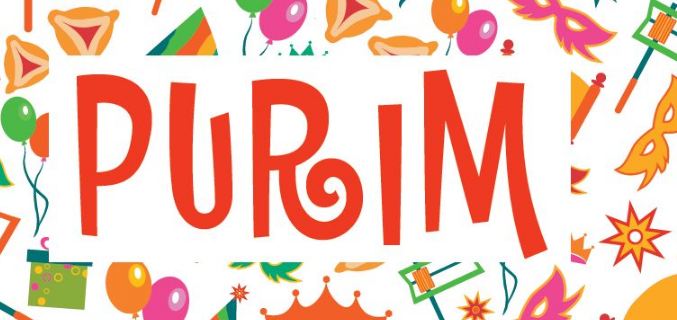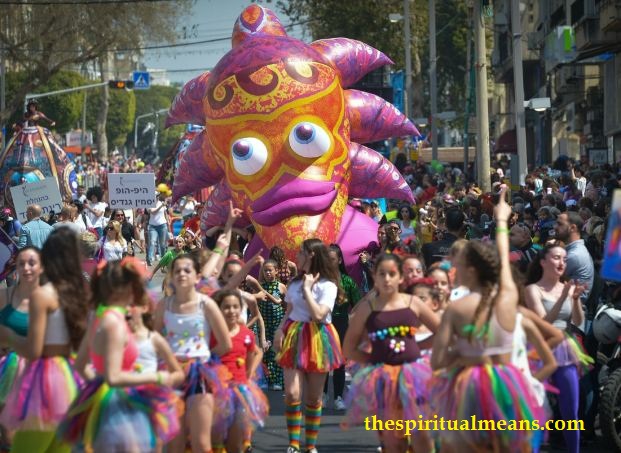Purim is a Jewish holiday that remembers how the Jewish people were saved from being killed by Haman, a Persian official.
The holiday is celebrated with feasting, drinking, and the reading of the Book of Esther. In addition to its historical significance, Purim has spiritual meaning and symbolism that can be explored.
In this article, I will explore the spiritual meaning of Purim and what it may be trying to tell us.

Historical Significance of Purim
The narrative of Purim unfolds within the pages of the Book of Esther. It revolves around Ahasuerus, the Persian monarch, who becomes infuriated when his queen, Vashti, declines to appear before him and is subsequently removed from her position.
To seek a replacement, Ahasuerus orchestrates a beauty competition, in which Esther, a woman of Jewish descent, is ultimately chosen as the new queen. Concealing her Jewish heritage, Esther ascends to the role of queen.
In a pivotal moment, Esther discloses her true identity and, with the support of her cousin Mordechai, manages to persuade the king to spare her people from impending doom.
Additionally, it serves as a vivid example of the influence of individual actions, demonstrating how a single person can leave an indelible mark on the world.
Spiritual Significance of Purim
Beyond its historical importance, Purim carries profound spiritual significance for its celebrants. Below are several essential spiritual themes that characterize the holiday:
Celebration of Unity
Purim stands as a commemoration of the solidarity among the Jewish populace.
Throughout this festive period, individuals of Jewish heritage assemble to recite the Book of Esther, bestow gifts upon one another, and indulge in customary delicacies like hamantaschen pastries formed in triangles and filled with fruit or poppy seeds.
This occasion serves as a chance to foster connections within one’s community and to honor the resilience inherent in Jewish identity.
Joy and Gratitude
Purim emerges as a festive occasion, replete with happiness, where it is tradition to revel in music, dancing, and donning various costumes.
This festive period also offers an opportunity to express appreciation for the bestowed blessings.
The teachings within the Book of Esther guide individuals to “send portions to one another, and gifts to the poor” (Esther 9:22), underscoring the significance of generosity towards others and the propagation of delight.
Check for more: Acorn Spiritual Meaning
Overcoming Evil
The narrative of Purim serves as a poignant reminder that goodness holds the potential to prevail over malevolence.
Haman, the antagonist in this tale, symbolizes the facets of tyranny and animosity, while the endeavors of Esther and Mordechai serve as a testament to the feasibility of opposing and conquering such malevolent forces.
This holiday acts as a clarion call, urging individuals to stand against injustice and reinforcing the notion that a solitary individual’s actions possess the capability to effect transformative change in the world.
Lessons of Purim for Today
The teachings gleaned from Purim continue to hold immense relevance in the present day, resonating just as strongly as they did millennia ago. Consider the following ways in which we can integrate the spiritual insights of Purim into our contemporary lives:
Champion Righteousness
The Purim narrative underscores our duty to vocally oppose injustice and uphold principles of morality, even when faced with challenges. Esther’s courageous act of risking her life to safeguard her people serves as an exemplar of bravery that can motivate us all.
Embrace Pluralism
Purim not only celebrates the cohesion of the Jewish community but also serves as a poignant reminder of its inherent diversity.
The holiday presents an occasion to honor the array of cultures, languages, and traditions encompassed within the Jewish identity, spotlighting the richness born out of this diversity.
Contemplating Identity
Purim stands as a holiday that accentuates the significance of Jewish identity. The pivotal point in the narrative comes when Esther opts to disclose her Jewish heritage, highlighting the pivotal notion of authenticity.
In the present era, Purim offers Jews a chance to contemplate their personal identities and establish a connection with their ancestral legacy.
Fighting Against Oppression
Purim’s narrative embodies a tale of defiance against oppression. Haman’s scheme to eradicate the Jewish population epitomized animosity and bias, while the actions of Esther and Mordechai stood as a form of defiance against this very animosity.
In the contemporary landscape, Purim functions as a poignant cue that our commitment to combat all varieties of oppression must endure, alongside our unwavering support for those marginalized and oppressed.
The Power of Community
Purim stands as a holiday that underscores the potency of community in catalyzing constructive transformation.
The tale of Purim extends beyond the narratives of Esther and Mordechai; it encapsulates the narrative of an entire collective uniting to counter oppression.
In contemporary times, Purim presents a chance to foster connections within one’s community, extend mutual support, and collaboratively pursue shared objectives.
Check for more: Cicada Spiritual Meaning
The Importance of Faith
Purim manifests as a holiday that accentuates the significance of faith. Within the Purim narrative, the unwavering faith of Esther and Mordechai in God empowered them to stand against oppression and initiate change.
In the contemporary context, Purim acts as a poignant reminder that faith possesses the potential to wield a formidable influence for positive change in the world.
The Role of Women
Esther, the central figure in the Purim narrative, stands as a compelling embodiment of a woman who harnessed her influence to instigate constructive transformation.
Her courage and intellect played a pivotal role in the salvation of the Jewish populace, underscoring the enduring role women have historically held in effecting beneficial shifts.
Her tale stands as a reminder of the significant contributions women have made throughout history in shaping positive change.
The Power of Forgiveness
Purim surfaces as a holiday that accentuates the value of forgiveness. Within the Purim narrative, Esther and Mordechai exemplified forgiveness towards their vanquished adversaries, guiding the Jewish community to follow suit.
Presently, Purim serves as a poignant reminder that forgiveness possesses the potential to wield a profound influence in fostering healing and reconciliation.
The Connection Between Purim and Passover
Purim and Passover stand as two significant Jewish holidays with multiple interconnections. Both celebrations revolve around the notion of emancipation from oppression, entailing narratives and rituals that serve as conduits for transmitting vital values across generations.
The Importance of Celebration

Purim emerges as a holiday highlighting the significance of revelry. Within the Purim narrative, the Jewish community commemorated their triumph over oppression and this jubilation endures in present times.
Purim functions as a poignant cue, underscoring the value of pausing to commemorate our achievements and discovering delight in the world that surrounds us.
The Symbolism of the Purim Story
The narrative of Purim remains rife with symbolism that retains its relevance in the contemporary era. Haman represents oppression and hostility, whereas Esther and Mordechai represent strength and persistence.
The story’s underlying themes of identity, community, and resistance retain their pertinence, offering a wellspring of inspiration to individuals from diverse faiths and backgrounds.
The Importance of Giving
Purim stands as a holiday that underscores the significance of generosity. Esther and Mordechai led the Jewish community on Purim to exchange gifts and help the needy.
Purim is a time to help others and support community-minded nonprofit organizations.
The Connection Between Purim and Joy
Purim emerges as a holiday dedicated to amplifying joy and delight. Within the Purim narrative, the Jewish community marked their triumph through feasting, merry-making, and indulgence.
In the contemporary setting, Purim extends an occasion to unwind, relish in merriment, and uncover happiness in the world that envelops us.
Conclusion
In conclusion, Purim is a Jewish holiday that holds deep spiritual significance for those who observe it. The story of Purim, as described in the Book of Esther, highlights themes such as courage, faith, divine intervention, and the triumph of good over evil.
The characters and events in the Purim story also hold symbolic meaning that goes beyond their historical context.
The providential hand of God is evident throughout the Purim story, highlighting the belief that there is a higher power guiding and orchestrating events in the world.
Visit thespiritualmeans.com for more stuff!
People Can Also Search For:-
- purim meaning in hebrew
- story of purim in a nutshell
- what is the feast of purim in the bible
- how is purim celebrated today
- how to celebrate purim
- purim aish
FAQs
Purim is a Jewish holiday commemorating the deliverance of the Jewish people from a plot to exterminate them, symbolizing triumph over adversity.
While interpretations can differ, Purim universally represents hope, unity, and the importance of standing against injustice.
Purim is significant in Judaism as a celebration of divine intervention, unity, and the resilience of the Jewish community.
Yes, Purim celebrates Queen Esther’s bravery in saving her people.
Yes, Purim is marked by joyous celebrations, symbolizing gratitude, happiness, and the recognition of life’s blessings.
Gift-giving during Purim, known as “Mishloach Manot,” fosters unity and kindness among the community, embodying the spirit of the holiday.
Yes, the Book of Esther is central to Purim observances, emphasizing the themes of divine providence, courage, and justice.
Dressing up for Purim signifies the concealed divine intervention and promotes celebration.
Giving to the needy during Purim emphasizes compassion, empathy, and social responsibility, aligning with the holiday’s themes.
Yes, Purim underscores the importance of unity among the Jewish people and humanity at large, fostering a sense of community.

Mastin Kipp is a modern spiritual teacher, author, and entrepreneur known for his work in the field of personal development and self-help. Kipp’s teachings often focus on topics such as self-love, healing from past traumas, and creating a life of purpose and fulfilment.
